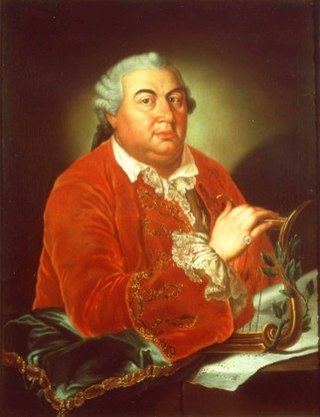
Leonardo di ser Piero da Vinci was an Italian polymath of the High Renaissance who was active as a painter, draughtsman, engineer, scientist, theorist, sculptor, and architect. While his fame initially rested on his achievements as a painter, he also became known for his notebooks, in which he made drawings and notes on a variety of subjects, including anatomy, astronomy, botany, cartography, painting, and paleontology. Leonardo is widely regarded to have been a genius who epitomized the Renaissance humanist ideal, and his collective works comprise a contribution to later generations of artists matched only by that of his younger contemporary, Michelangelo.

Leonardo Vinci was an Italian composer known chiefly for his 40 or so operas; comparatively little of his work in other genres survives. A central proponent of the Neapolitan School of opera, his influence on subsequent opera composers such as Johann Adolph Hasse and Giovanni Battista Pergolesi was considerable.

Niccolò Jommelli was an Italian composer of the Neapolitan School. Along with other composers mainly in the Holy Roman Empire and France, he was responsible for certain operatic reforms including reducing ornateness of style and the primacy of star singers somewhat.

Niccolò Piccinni was an Italian composer of symphonies, sacred music, chamber music, and opera. Although he is somewhat obscure today, Piccinni was one of the most popular composers of opera—particularly the Neapolitan opera buffa—of the Classical period.
The year 1724 in music involved some significant musical events.
Iphigénie en Tauride is a 1779 opera by Christoph Willibald Gluck in four acts. It was his fifth opera for the French stage. The libretto was written by Nicolas-François Guillard.
Angelo Tarchi was an Italian composer of numerous operas as well as sacred music. Between 1778 and 1787, he worked primarily in Italy, producing five or six new operas each year.
Ifigenia in Tauride can refer to:

Catone in Utica is an opera libretto by Metastasio, that was originally written for Leonardo Vinci's 1727 opera. Following Vinci's success, Metastasio's text was used by numerous composers of the baroque and classical eras for their own operas, including Pietro Torri (1736), Antonio Vivaldi (1737), Giovanni Battista Ferrandini (1753) and J. C. Bach (1761).
Iphigenia is a figure in Greek mythology.

Ifigenia in Tauride is an opera in three acts by Niccolò Jommelli set to a libretto by the Mannheim court poet Mattia Verazi. It premiered on 30 May 1771 at the Teatro di San Carlo in Naples to celebrate the name day of Ferdinand I of the Two Sicilies. The story is based on Iphigenia in Tauris by Euripides.

Didone abbandonata was an opera in three acts composed by Tomaso Albinoni. Albinoni's music was set to Pietro Metastasio's libretto, Didone abbandonata, which was in turn based on the story of Dido and Aeneas from the fourth book of Virgil's Aeneid. The opera premiered on 26 December 1724 at the Teatro San Cassiano in Venice and was the first time that an opera based on a Metastasio libretto was performed in Venice.

Semiramide riconosciuta is an Italian opera with serious action, or dramma per musica, by Nicola Porpora, set to a libretto by Metastasio with some textual changes, possibly by Domenico Lalli. The opera was written for some of the finest contemporary singers, and includes a technically demanding series of da capo arias.

Gian Francesco de Majo was an Italian composer. He is best known for his more than 20 operas. He also composed a considerable amount of sacred works, including oratorios, cantatas, and masses.
Diego Fasolis is a Swiss classical organist and conductor, the leader of the ensemble I Barocchisti. He has conducted operas in historically informed performance at major European opera houses and festivals, and has made award-winning recordings.
Mattia Verazi was an Italian librettist primarily active at the court of Charles Theodore in Mannheim. He became known as the leader of a group of librettists who challenged the conventions of opera seria in the mid-18th century and was a long-time collaborator of composer Niccolò Jommelli. He also produced the libretti for Salieri's Europa riconosciuta, Sacchini's Calliroe, and J. C. Bach's Temistocle

Ifigenia in Tauride is an opera in three acts by Tommaso Traetta to a libretto by Marco Coltellini. It premiered on 4 October 1763 at Schönbrunn Palace, Vienna. The opera was revived at the Schwetzingen Festival in December 2013 conducted by Wolfgang Katschner.
Ifigenia in Tauride is an opera in three acts by Gian Francesco de Majo to a libretto by Mattia Verazi. It was commissioned by Elector Palatine Carl Theodor, and premiered in 1764.









